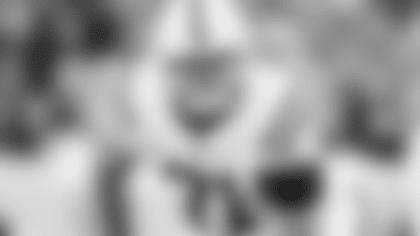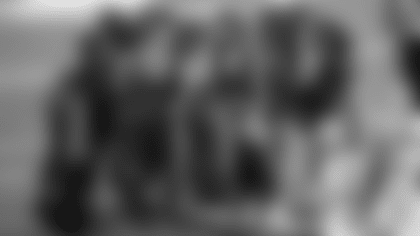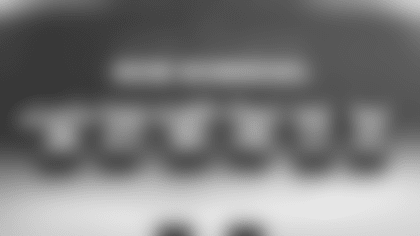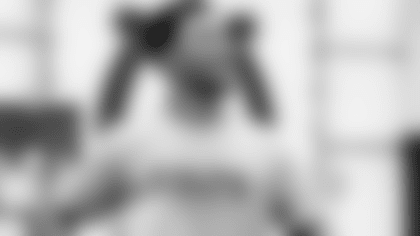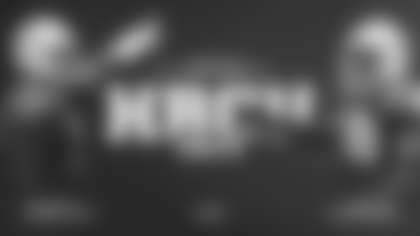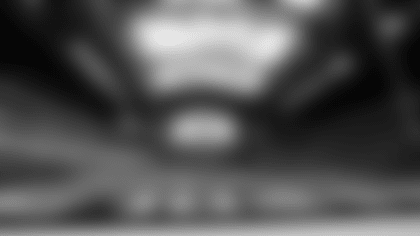Bill Polian is in his first season as Colts vice chairman after spending the previous 13 seasons as Colts president. Polian has a resume unique in the NFL. The only man to win NFL Executive of the Year six times, Polian in the 1980s built the Buffalo Bills into a four-time Super Bowl participant. In the mid-1990s, he built the expansion Carolina Panthers into a team that made the NFC Championship game in its second season, 1996. Since joining Indianapolis in 1998, he built the Colts from a 3-13 team in 1997 and 1998 into one that has made the playoffs 11 of the last 12 seasons, including AFC Championship game appearances after the 2003, 2006 and 2009 seasons, an AFC East title in 1999, AFC South titles in 2003, 2004, 2005, 2006, 2007, 2009 and 2010, Super Bowl appearances following the 2006 and 2009 seasons and a Super Bowl championship following the 2006 season. Each week during the season, in The Polian Corner, Polian and Colts.com will discuss issues pertinent to the Colts and the rest of the NFL.
The Polian Corner will run in two installments each week. Below is this week's second installment:
Q: I believe I heard you say once that the team would approach free agency with an open checkbook, but that never seemed to happen. Why was that? Also, with all the injuries, is the team's conditioning program an issue, particularly when Peyton Manning is in there because players are more beholden to him to block?
A: First and foremost, I never said that we would approach free agency with an open checkbook. As a matter of fact, I am very wary of free agency. I do not think that free agency is an answer to one's critical needs, and I'm not sure, other than re-signing your own players, that it really is the answer to anything, very frankly. We've spent a lot of time studying the issue with teams in baseball and basketball. We have come to the conclusion that in basketball it truly can make a difference, although there is a different set of circumstances there. Free agents pick and choose markets, I'm told by basketball people. They can make a difference because there are only five players. Baseball they certainly can make a difference in a lot of cases, particularly on the mound because there are only nine players who play and there are only four starters who start, basically. One of those guys (pitchers), if you get a number one, or even a number two or three, they make a huge difference and because of a longer schedule, CC Sabathia goes out there 30 times a year. They have an impact there, though the baseball people tell us far less than the money they command on the open market, which is another interesting part of free agency. Every general manager in every sport will tell you, even including signing your own players back, that you over-pay in free agency. The question is, 'How much do you over-pay?' That's why there is free agency. That's why the players' unions and agents have fought for it for so long. The fight for free agency went on for nearly 80 years in baseball. Soon thereafter, basketball and, some years after that, football followed. You always over-pay in free agency, there's no question about it. It isn't economically a good value, let me put in that way, no matter who you may get. It's highly unlikely that I would say we would approach free agency with an open checkbook. The most important reason is that my boss would not have allowed me to do that. He's very conscious of wanting value for his dollars, and he should be. I think, more than likely, I may have said that some teams will approach it with an open checkbook. You may have misunderstood or misread what I said, or someone may have misstated it over time. On the second question regarding conditioning, we study every injury that we have. We study it for the type of injury. We study it for the body part. We study it for how it occurred. We study it where it occurred, when it occurred. All of those things are factored into an equation and we run it through the computer. Every week, we can go and look at the injury report and know what kinds of injuries we're getting, where they're occurring and how they're taking place. In the past, we've adjusted practice to accommodate some things of that nature, based on what the statistics showed us. My answer is based on hard, statistical fact, not conjecture or simply observation. I don't have statistics in front of me, so forgive me for not being absolutely precise, but virtually all of the injuries that we've had have been trauma injuries, meaning that a player has hurt his knee because of a situation that occurred with another player hitting him, or he was changing direction causing trauma to the joint. The best example of that is Ben Ijalana, who executed a pass drop against Tampa Bay on grass (and) crumpled to the ground. Immediately, we knew it was a knee injury. Those things, unfortunately, happen far too often in our game. It has absolutely nothing to do with conditioning. So, conditioning is not a factor. I'm not sure that Peyton's (Manning) desire or need to motivate people to block for him changes how people block. That's not the way the game works. The tempo changes, but our conditioning has been so good that that never has been a factor for us. I've studied the injuries. I'm as frustrated by them as you, perhaps more so. In the vast majority, the overwhelming majority of cases, there isn't anything we could have done to avoid them.
Q: With Joseph Addai's injury, Delone Carter's fumbling and the perception that you're not happy with Donald Brown coming into the season, when will Darren Evans be given some carries to see what he can add to the running game?
A: As (former Colts head coach) Tony (Dungy) used to say, 'There's a difference between perception and reality, and the difference is fact.' I have to address the perception. The perception that we are not happy with Donald Brown is a complete misperception. There are those in other quarters who are not happy with Donald Brown, but we here at the Colts are not among them. We feel Donald is a terrific player. His talents are different than Delone Carter's. He's more of an outside, speed runner than he is an inside-the-tackles runner. He's more of a speed, outrun-you kind of runner than Joseph Addai is, who is much more of a shake-and-bake guy. The styles of the three backs are completely different, which is a good thing because you can run different plays with different guys. We like Donald Brown and always have liked Donald Brown and believed very strongly that he would contribute and play the way he has this year. He just needed touches, that's all. In regard to Delone Carter, he fumbled the ball in a critical situation. He's not the first guy ever to have fumbled, and he won't be the last. Edgerrin James fumbled. Marshall Faulk fumbled. It is a cardinal sin for a running back to fumble. It should not happen. The way it happened is the way it happens to virtually every rookie. It happened to Edgerrin James, and it happened to Delone Carter. Most fumbles are caused in the National Football League by people coming from behind who whack at the ball. That doesn't happen at the college level for two reasons. Number one, the running backs at the college level are so fast and so good that nobody catches them from behind. Secondly, the defenders aren't that skilled that they can knock the ball out. It happens only in the National Football League. Rookies always, always have that problem. Edgerrin James had that problem. I recall distinctly sitting down and talking with him about it and explaining that it only happens in the National Football League. That he never experienced it at Miami and that he will experience it in the National Football League. Lo and behold, he did. He cleaned it up and went on to a stellar, perhaps Hall-of-Fame, career. Delone Carter will get over this. There's no problem with it. He just needs to remember he needs to keep the ball high and tight all the time, every time, because someone is going to take a swipe at it. That's all a part of a rookie learning to play in the National Football League. I would presume if Joe is not back any time soon, and we don't know if that is the case. In fact, I saw him this afternoon, and he was in good spirits. There's some likelihood he might be back even this week. It may be tough for Darren to get time. Absent Joe, he should get some touches. We like what we see. I'm sure he will get his opportunities as time goes by.
Q: People have no idea what it takes to run a business like the Colts. If they did, they would not be second-guessing. You brought a championship to Indianapolis and like everything else, you get knocked down, but you will get back up. The Colts will come back, and I have faith.
A: Thank you very much for the kind words. There's a lot of wisdom in that. When you've been around life, you recognize that you get knocked down many more times than you win. It's, as Vince Lombardi said, 'It's not failing that is the issue. It's failing to rise that's the issue.' Around here, we've never failed to rise, whether it was losing to Jacksonville and getting run on for 375 yards late in the (2006) season. We came back and won the Super Bowl that very same year. It doesn't matter. We've had our ups and downs. This (season) is a lot farther down than we would have wished or would have wanted. We'll bounce back. We have fighters. One of my favorite mantas, the one that really sticks in my mind is, 'Tough times don't last. Tough people do.' We have a lot of tough people here – on the field, on the coaching staff, in the front office and we will prevail. We will prevail pretty darned soon.
Q: Can you share any of the names we have on the draft board?
A: Truthfully, they're not up there yet. We haven't had our December and January draft meeting, which takes place right around the Christmas holidays when we first put the names up. There aren't any names up there yet. They'll be up after the Christmas holidays, but that will be only a very preliminary point of view. That's based on incomplete information. It's interesting that there are all kinds of gurus out there ranking players and telling everyone where they're going to be drafted. Here's what we know about players at this point. We know how they played against the opponents they (faced). We know if they came through the season injury-free, or if they were injured. We will know, as the end of the season and the bowl games progress, how they played against top-flight opponents, which is very important. What we don't know is what their physical history is. What we don't know is what their mental acuity is. What we don't know is how their coaches view them and the fine points of strengths and weaknesses that the coaches have spotted over the years. We don't know a whole heck of a lot about their work ethic, and we certainly don't know what their psychological make-up is. That's three-quarters of the information that goes into making a decision. To give you a real-life example at this time 14 years ago, Ryan Leaf was considered to be the number one prospect in all of America, perhaps the greatest quarterback ever to play the game by the gurus, and Peyton Manning's quote, 'Stock was falling' unquote. Right now even if we had information and we don't, it would be incredibly incomplete. It won't be complete and we won't have a real good picture until the end of March.
Q: In addition to Marvin Harrison going into the Ring of Honor, it's interesting that the number one pick, Cam Newton, is coming to town. His team's 2-8, but he's had a good year, hasn't he?
A: Yes, he has. He's had a good year. He does everything he did at Auburn and does it quite well. He can buy a second chance in the pocket. He can throw on the run. He can run the football. He runs the option. They've got two exceedingly good running backs to go along with him in DeAngelo Williams and Jonathan Stewart, both of whom are very fast and very powerful. Not unlike (Jacksonville's Maurice) Jones-Drew. In Steve Smith, he has a go-to speed wide receiver who can run by anybody in the league, and does that exceptionally well. Cam has an arm that can throw it 70 yards, so Steve can out-run everybody and Cam can get the ball there accurately. In Greg Olsen and Jeremy Shockey, he has two tight ends who are a rookie quarterback's best friend because when you get in trouble and you see a defensive coverage you perhaps are not used to, or that you're not sure of, you can just check it down to the tight end. Both guys catch the ball very, very well. They both run well after the catch. They are a very productive offense. They make you defend virtually everything, and the addition of the option makes it exceedingly, exceedingly tough to handle. He's a big guy, 6-4, 240 pounds. The pounding hasn't taken its toll. He's still feels free to run with the football. The likelihood is that will get beaten out of him over time, but it hasn't happened yet. He's free-wheeling it now, and that's not a good thing for our defense. You have to stop him. He's the key to it. Even then, they're difficult to handle, but you have to stop him. Defensively, they've had a lot of injuries, but they play awfully well. They got the kicking game going last week. They returned a kick for a touchdown, so they're really hitting on all cylinders now. They had a crazy, wild, back-and-forth game with the Lions, but the Lions scored a lot points to win it. That's not our strong suit at this point. We have to play great defense if we're going to have a chance against these guys.





